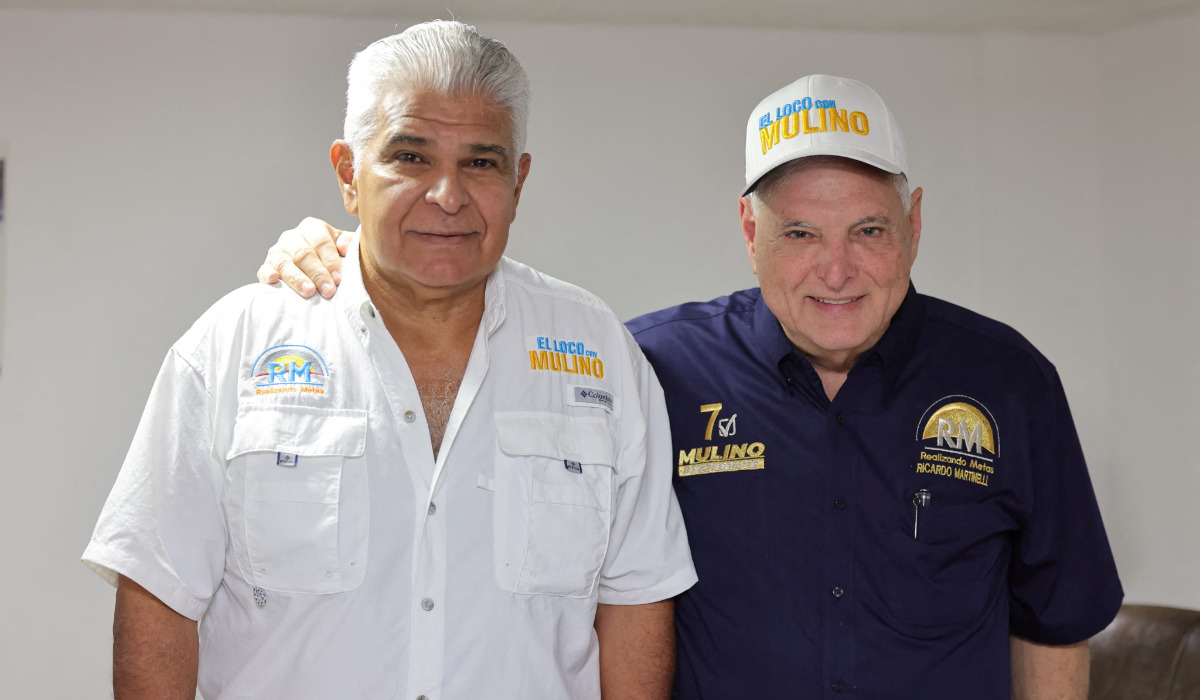PANAMA CITY: Panama’s former security minister Jose Raul Mulino on Sunday stormed to victory in a presidential poll dominated by his old boss, the corruption tainted ex-leader Ricardo Martinelli, who buttressed his campaign while holed up in Nicaragua’s embassy.
Mulino was one of the favorites for the presidency after he stepped in to replace Martinelli on the ballot when the popular former president was barred from running due to a money laundering conviction.
“I promise to the country at this time to put together, to establish, a government of unity as soon as possible,” Mulino said after electoral officials video called him to confirm he had won the presidency.
Earlier, Mulino supporters waved flags, clapped and cheered inside the campaign headquarters as results trickled in. “Martinelli, friend, the people are with you,” supporters shouted.
In a strange election campaign, Martinelli played a key role drumming up support for Mulino from Nicaragua’s embassy in Panama’s capital, where he sought asylum. Many voters saw Mulino as a proxy for Martinelli, though opponents called him a puppet of the former president.
Nicaragua granted Martinelli asylum but Panamanian authorities have blocked him from leaving the country. Mulino visited Martinelli at the embassy after casting his vote on Sunday.
Mulino was declared winner having secured about 34 percent of the ballots tallied with 90 percent of the total vote counted. Ricardo Lombana, who trailed in second place with about 25 percent of the vote, congratulated Mulino on his victory.
Mulino, a pro-business right-wing politician, faces a daunting task of mending social divisions and regaining the faith of an electorate fed up with political graft.
Among his top priorities will be fixing Panama’s pressing economic problems, tackling corruption, and restoring the country’s reputation as an investment haven.
“We know that now as president he can fix the country,” said Hayde Gonzalez, 46, a medic who danced with her daughters in the center of the capital upon hearing Mulino was pulling ahead as votes were counted.
“There will be more security and the economy will recover,” she added.
Mulino has promised to usher in prosperity through ambitious infrastructure investment and a higher minimum wage, while suggesting he would keep Martinelli out of jail.
Magali Rosa, 60, a retiree, said she voted for Mulino because she felt he could bring more jobs and improve security, and that during the Martinelli there was “a lot of money” for everyone.
Mulino will take office on July 1 for a five-year term. (Reporting by Valentine Hilaire and Elida Moreno; writing by Drazen Jorgic; editing by Stephen Eisenhammer, Andrea Ricci, Lisa Shumaker, Deepa Babington and Lincoln Feast.)

Presidential candidate Jose Raul Mulino poses with ex-president Ricardo Martinelli during the general election, in Panama City, Panama, in this handout picture released on May 5, 2024. (REUTERS)
Mulino, running under the Achieving Goals and Alliance parties, faced off against anti-corruption candidate Ricardo Lombana, who trailed in second, former President Martín Torrijos and former candidate Rómulo Roux.
All three conceded to Mulino on Sunday evening, with Roux saying Panama chose “a different proposal than the one we put forward.”
But his ties with Martinelli seemed to pull him across the finish line. Mulino ran on the promise to usher in another wave of economic prosperity, and stop migration through the Darien Gap, the perilous jungle region overlapping Colombia and Panama that was traversed by half a million migrants last year.
The lawyer also vowed to help his ally in his legal woes. After voting Sunday, Mulino strolled into the Nicaraguan Embassy trailed by photographers and wrapped Martinelli in a big hug, saying, “Brother, we’re going to win!
Before even half of the votes had been counted, supporters in Mulino’s campaign headquarters erupted in celebration, singing and waving flags. Panama doesn’t have a runoff system, so the candidate with the biggest share of votes wins.
Martinelli posted a blurry photo of his own face on the X social media platform, writing: “This is the face of a happy and content man.”
Despite the fatigue of endemic corruption in Panama, many voters like Juan José Tinoco were willing to overlook the other corruption scandals plaguing their former leader in favor of the humming economy seen during his presidency. The 63-year-old bus driver voted for Mulino from his working-class area of small, concrete houses surrounded by extravagant skyscrapers.
“We have problems with health services, education, we have garbage in the streets ... and corruption that never goes away,” Tinoco said. “We have money here. This is a country that has lots of wealth, but we need a leader who dedicates himself to the needs of Panama.”
The presidential race had been in uncertain waters until Friday morning, when Panama’s Supreme Court ruled that Mulino was permitted to run. It said he was eligible despite allegations that his candidacy wasn’t legitimate because he wasn’t elected in a primary.
Mulino faces an uphill battle moving forward, on the economy especially. Last year, the Central American nation was roiled for weeks by mass anti-government protests, which came to encapsulate deeper discontent among citizens.
The protests targeted a government contract with a copper mine, which critics said endangered the environment and water at a time when drought has gotten so bad that it has effectively handicapped trade transit through the Panama Canal.
While many celebrated in November when the country’s Supreme Court declared the contract unconstitutional, the mine closure and slashed canal transit will put Panama’s new leader in a tight spot.
Meanwhile, the country’s debt is skyrocketing and much of the economy has slowed, said Shifter, of Inter-American Dialogue, making it even harder for Mulino to regularize canal transit and staunch soaring levels of migration through the Darien Gap.
“Panama is at a very different moment than it’s been over the last 30 years,” Shifter said. Mulino “is going to face formidable obstacles. I mean, it’s going to be a daunting task for him.”































